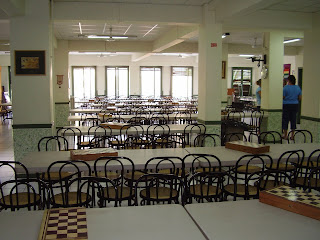
We climb to our second floor center. Unlocking and locking doors, dropping our bags off in the office, placing our water bottles in the fridge. It's time for devotions and prayer. We gather with the team and any volunteering visitors in the main room, three pots of tea already brewing. At about 11:15 we make our final preparations for Tea House. Check the game pieces, 15 of each color for Backgammon plus two dice, there are six pawns in chess, right? Lay out the rugs in the baby room and scatter the toys. Set down all of the chairs in the kid's room, crank up the air conditioner, pick out coloring pages, we'll do the fruits page and I still can't find the lemonade picture they all ask for. Begin sharping the colored pencils and pick out the movie for today, Tom and Jerry, their favorite. The computer is set up for checking refugees in, shower tickets are cut out and ready for distribution. The time: 11:45. Doors open.

For the next two hours I color and play with children, wash the neon colored mugs, pour hot tea and give three kisses on the cheeks as I greet my women refugee friends. I hold babies in their plastic bag diapers, sharpen more colored pencils and try to guess which child is holding their hands over my eyes. We all smile, laugh and complain about the heat. It's 2:00. We kick the reluctant children out of the room so we can clean up pencil shavings and set up for English class. Ten year-old Parviz insists on sweeping, I graciously let him. Although the announcement for English and Greek class hasn't been made, the regulars appear at 2:15 and take the best seats in the house. Class begins at 2:30. We pass out pencils and paper. I review body parts and colors. Pink is the hardest to learn and waist and wrist and west all sound alike. Review takes longer than expected. More students arrive. They sit in the back rows without desks. I offer children's books as a substitute. We learn about rooms in a flat and furniture today. They have 1000 Euro to buy furniture. They all insist on a television. Some of the Sudanese men are exceptional drawers. Alimria, a woman from Romania, has better penmanship than I do. Class is over at 3:30. Thank you, Teacher, they say as they pass in their pencils. See you next time, I reply. I love English class.
 I lock up the classroom and wander into the main room. I play checkers with the children. There is much excitement today as 'F' has been reading people's palms. I will have one husband and three children. The women laugh at my pained expression. We gather more cups until 4:00 arrives. Lights go out and we say good-bye to our friends.
I lock up the classroom and wander into the main room. I play checkers with the children. There is much excitement today as 'F' has been reading people's palms. I will have one husband and three children. The women laugh at my pained expression. We gather more cups until 4:00 arrives. Lights go out and we say good-bye to our friends.
 Time to clean. First we wash the tables, then dry. We put the chairs up and begin to sweep. Someone is assigned to clean the toilets, usually one of the visiting volunteers,naturally. We clean out the huge pots of tea and wipe the kitchen down. Some days we need to bring bags of donated clothes up from the closet downstairs into the clothing room to be sorted. Mopping is the final tasks as the tile floor becomes very slippery at its conclusion. After all of the check list has been finalized and the closer gives the okay we lock all the doors and go downstairs. We say goodbye to Mohammad and brace ourselves for another walk through Sofokelous and Monandrou to the metro and then home.
Time to clean. First we wash the tables, then dry. We put the chairs up and begin to sweep. Someone is assigned to clean the toilets, usually one of the visiting volunteers,naturally. We clean out the huge pots of tea and wipe the kitchen down. Some days we need to bring bags of donated clothes up from the closet downstairs into the clothing room to be sorted. Mopping is the final tasks as the tile floor becomes very slippery at its conclusion. After all of the check list has been finalized and the closer gives the okay we lock all the doors and go downstairs. We say goodbye to Mohammad and brace ourselves for another walk through Sofokelous and Monandrou to the metro and then home.
It's been about two weeks since I wandered this same path in Athens. I will never forget it. I am forever changed. I am more grateful for the life I have been blessed with and more aware of the world around me. This great movement of people, these refugees, their faces and their journeys will forever be with me. I will weep and I will smile and I will pray that hope is never lost, that all people will unite and that peace will be found.